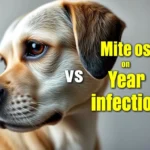
Understanding allergic reactions in dogs is essential for every pet owner. Allergies can significantly impact a dog’s quality of life, causing discomfort and distress. With the increasing prevalence of allergies among canines, it’s crucial for pet owners to recognize the signs and symptoms, understand potential allergens, and know how to manage their pets’ health effectively.
Understanding Allergic Reactions
What Are Allergic Reactions?
An allergic reaction occurs when a dog’s immune system overreacts to a substance that is typically harmless. This response can lead to various symptoms, from mild irritation to severe reactions that require immediate veterinary care. Allergies in dogs can develop at any age, and factors such as genetics, environment, and diet can influence their occurrence.
Common Allergens for Dogs
Dogs can be allergic to a plethora of substances, which can be categorized as follows:
- Environmental Allergens: These include pollen, dust mites, and mold, which can be prevalent in the dog’s surroundings.
- Food Allergens: Certain ingredients such as beef, chicken, dairy, and wheat are common culprits that can trigger allergic reactions.
- Flea Saliva and Insect Bites: Even a single flea bite can cause significant allergic reactions in sensitive dogs.
- Chemical Irritants: Household cleaners, pesticides, and other chemicals can irritate a dog’s skin or respiratory system.
Understanding what allergens are present in your dog’s environment and diet is the first step in managing their health.
Signs and Symptoms of Allergic Reactions
Common Symptoms
Recognizing the symptoms of allergic reactions in dogs is vital for timely intervention. Common signs include:
- Skin Reactions: Itching, redness, and hives are frequent indicators of an allergic response. Dogs may scratch excessively, leading to sore or infected skin.
- Gastrointestinal Symptoms: Vomiting and diarrhea can occur, particularly with food allergies. Monitoring your dog’s bowel movements can help identify potential food triggers.
- Respiratory Issues: Sneezing, coughing, and wheezing may indicate an allergic reaction, particularly related to environmental allergens.
- Behavioral Changes: Dogs may exhibit excessive licking, restlessness, or irritability when experiencing discomfort due to allergies.
Severe Reactions
In some cases, dogs can experience severe allergic reactions, known as anaphylaxis. Symptoms to watch out for include:
- Swelling of the face or throat
- Difficulty breathing
- Rapid heart rate
- Weakness or collapse
If you observe these signs, it is crucial to seek emergency veterinary care immediately. Anaphylaxis can be life-threatening and requires prompt treatment.
Diagnosis of Allergies in Dogs
Veterinary Examination
When you suspect your dog may have allergies, visiting a veterinarian is essential. A thorough examination can help determine the underlying cause of your dog’s symptoms. Vets may perform various tests, including:
- Skin Tests: These tests involve injecting small amounts of allergens into the skin to observe reactions.
- Blood Tests: Blood samples can identify specific allergens that may be causing the reaction.
Allergy Testing
There are two primary methods for allergy testing:
- Intradermal Testing: This method is considered the gold standard for diagnosing environmental allergies. It involves injecting allergens into the skin and observing for reactions.
- Serum Testing: This blood test measures the level of antibodies present against specific allergens. While it is less invasive, it may be less accurate than intradermal testing.
Both methods have their pros and cons, and your veterinarian will help determine which is best suited for your dog.
Treatment Options for Allergic Reactions
Immediate Management
For immediate relief from allergic reactions, various treatment options are available:
- Antihistamines: These can alleviate mild itching and discomfort. It’s essential to consult your veterinarian for appropriate dosages and to ensure safety.
- Corticosteroids: For more severe reactions, corticosteroids may be prescribed to reduce inflammation and manage symptoms.
Long-term Management Strategies
Managing allergic reactions in dogs often requires long-term strategies, including:
- Dietary Changes: Implementing an elimination diet can help identify food allergies. This involves removing potential allergens from your dog’s diet and reintroducing them one at a time to observe for reactions.
- Allergy Shots (Immunotherapy): This treatment gradually desensitizes your dog to specific allergens over time. It may require commitment, but many owners find it effective.
- Natural Remedies and Supplements: Some pet owners explore natural options like omega-3 fatty acids, probiotics, and herbal supplements. Always consult with your veterinarian before starting any new treatment.
Preventing Allergic Reactions
Environmental Control
Reducing exposure to allergens is a proactive approach to managing allergies. Consider the following tips:
- Regular Cleaning: Vacuum and dust your home frequently to minimize dust mites and other allergens.
- Air Filtration: Using HEPA filters can help capture airborne allergens.
- Outdoor Management: During peak pollen seasons, limit your dog’s outdoor activities and wipe their paws after walks to remove allergens.
Food Management
Choosing the right diet is crucial for dogs with food allergies:
- Hypoallergenic Dog Food: Consult your veterinarian about hypoallergenic options that exclude common allergens.
- Ingredient Labels: Always read labels carefully to avoid ingredients that could trigger an allergic reaction.
Flea and Tick Prevention
Fleas can cause intense allergic reactions in some dogs, so effective flea control is vital:
- Recommended Products: Discuss with your vet the best flea and tick prevention products that suit your dog’s needs.
- Regular Check-ups: Routine veterinary visits can help monitor your dog’s health and prevent potential allergic reactions.
When to Seek Veterinary Help
Recognizing Severity
Knowing when to contact a veterinarian is essential for your dog’s health. Consider reaching out if:
- Symptoms persist despite home management
- Severe reactions occur, such as difficulty breathing or swelling
- You are uncertain about the cause of your dog’s symptoms
Preparing for Your Vet Visit
When visiting the veterinarian, come prepared with information to help diagnose your dog’s condition:
- Symptom Diary: Keep a record of your dog’s symptoms, including when they occur and any potential triggers.
- Questions to Ask: Prepare questions about diagnosis, treatment options, and preventive measures to ensure comprehensive care.
Conclusion
Recognizing and managing allergic reactions in dogs is crucial for ensuring their well-being and quality of life. By understanding the common allergens, identifying symptoms, and employing effective treatment and prevention strategies, you can help your furry friend live a more comfortable life. Being proactive in your approach will make a significant difference in managing allergies and keeping your dog healthy and happy.









